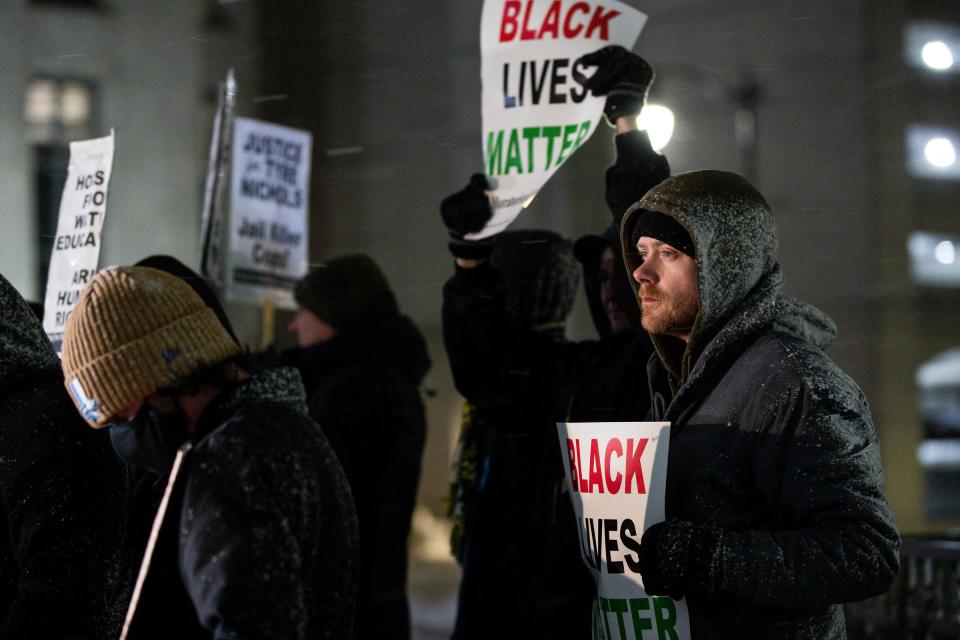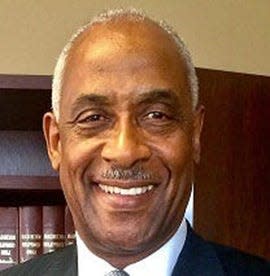Opinion: What the police killing of Tyre Nichols tells us about institutional racism
People who think institutional racism is a myth or a dusty remnant of our past are finding cover — and perhaps comfort — in the horrific Jan. 7 beating of Tyre Nichols by five Memphis police officers. The blind-to-race bunch have concluded that this time, and perhaps every time going forward, racism can be ruled out as an explanation when a Black man dies during or soon after a violent confrontation with police. After all, it was five Black officers who beat Tyre Nichols beyond recognition, not White nationalists wearing blue.
But I’m convinced that institutional racism is the culprit in Memphis — just as much as it was in Minneapolis in 2020, when Derek Chauvin murdered George Floyd with the help of teammates on the city police force. When those five Black officers face their public reckoning for alleged second-degree murder, institutional racism in law enforcement must once again go on trial.
The truth is that those who so recklessly assaulted Nichols also bought into the belief that most young Black men are troublemakers who deserve any ill treatment they get from police. Such racist attitudes are prevalent throughout law enforcement organizations, coast to coast.

Too close to home
Consider a federal jury’s decision Dec. 7 in favor of Detroit Police Sergeant Johnny Strickland.
Strickland, a Black man who is still on the force, filed a lawsuit in 2018 that alleged the Detroit Police Department created a racially hostile work environment and violated his civil rights. The jury awarded Strickland $150,000 in damages. He was able to prove that he was handcuffed and roughed up at a crime scene in 2017, although he identified himself then as a police officer. Later, Strickland was suspended for filing an internal complaint over his treatment, and was racially harassed by his colleagues. I was a member of Strickland’s legal team, which was led by the American Civil Liberties Union. The ACLU described our legal victory as a matter of exposing “racist policing practices.”

Strickland’s experience took place in a city where Black residents comprised an estimated 77.9% of the population in 2021, according to the U.S. Census. More to the point, Black officers were 56.3% of the Detroit police force in 2019, with white officers accounting for 34.7% and Hispanics 5.1%, according to police statistics. The demographics are very similar in Memphis, where Black residents made up 64.6% of the city’s population in 2021, the Census estimated. The statistical breakdown by race on the Memphis police force is almost identical to Detroit’s. Yet, five Black officers seem to have had no problem torturing a defenseless young man who looked like them.
A toxic culture
Where does such evil come from? From the culture of the workplace, once institutional racism has rooted itself deeply in the organization. That process took many years in the police departments of Detroit and Memphis, and rooting it out will also take time — and commitment. That’s no easy task when cops, like the members of any tightly knit organization, are rewarded if they support their work culture, and punished professionally if they don’t. The result is a statistical snapshot like this one: During the last six months of 2019, Memphis police officers used physical force against Black men seven times more than they did against White men, according to city data obtained by Memphis TV station WREG.
More:U-M report looks at what police reforms work as Tyre Nichols' death spurs national debate
Increasing racial diversity through hiring and retention is one way to push back against a toxic, racist culture. For instance, according to the Marshall Project, a nonprofit organization that reports on criminal justice, a recent study by the Ford School Center at the University of Michigan cites research showing that Black police officers stop Black citizens in public far less than White officers do. As we know, traffic stops have jump-started numerous violent confrontations between Black people and cops, including the Nichols killing.
Diversity isn't enough
But in the end, the key to rooting out institutional racism in law enforcement agencies is identifying and eliminating organizational practices, policies and procedures that create a racially discriminatory work environment. For instance, in my two class-action lawsuits against the Michigan State Police and the Michigan Civil Service Commission — successfully concluded in October 2021 — I was able to show that the state had been asking for job qualifications unrelated to the work involved (such as a solid credit history) that had a negative impact on Black applicants. Using similar methods of investigation, the federal government shed light on racial discrimination at the Michigan State Police that led to a consent decree from 1977 to 1993 and transformed policing in the state for a generation. When roadblocks that perpetuate racism are removed, an organization can reboot as one that respects all employees and the community it serves.
Working with the National Black State Troopers Coalition, where I serve as general counsel, I’m promoting a proven blueprint for eliminating institutional racism and monitoring the mental health of officers in state police agencies nationwide. My approach is to use specially trained experts such as industrial organizational psychologists to isolate evidence of racism in law enforcement agencies. I certainly view this initiative as essential to our future. As this century progresses, ending institutional racism is the most urgent imperative we face as a nation.
Leonard Mungo is the founder and owner of Mungo & Mungo at Law PLLC, headquartered in metro Detroit. He also serves as general counsel for the National Black State Troopers Coalition.
This article originally appeared on Detroit Free Press: Opinion: What killing of Tyre Nichols says about institutional racism

